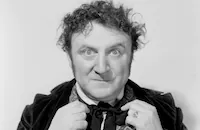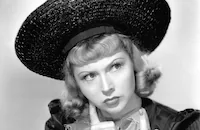Westward Passage

Brief Synopsis
Cast & Crew
Robert Milton
Ann Harding
Laurence Olivier
Zasu Pitts
Irving Pichel
Juliette Compton
Film Details
Technical Specs

Synopsis
After enjoying a romantic honeymoon at a country inn, Olivia and Nick Allen return to their city apartment and begin to quarrel. While Nick, a burgeoning novelist, complains that his publisher wants to turn him into a "hack" writer, Olivia frets over their lack of space and money. When Olivia then announces that she is pregnant, Nick expresses his disappointment and his apprehension about their future. Three years later, Nick, still struggling with his writing, explodes when he discovers that his young daughter Olivia has been playing with his typewriter and, following a tirade against his chaotic home life, threatens to move into a place of his own. Concerned for Olivia's happiness, businessman Harry Ottendorf, a longtime admirer, talks to Nick about changing his ways, but Nick, overcome with jealousy, accuses Olivia of adultery and sues for divorce. Harry and Olivia then marry, and six years later, vacation in Europe with little Olivia. While in Lucerne, Switzerland, Olivia runs into Nick, who is in Europe promoting his new novel. Now a success, Nick immediately displays his interest in Olivia and, in spite of her protests, insists that they dine together after Harry has been called to Chicago on business. Olivia, sensing her own re-kindled attraction to Nick, declares her devotion to the kind Harry but fails to discourage Nick, who then shows up on the same Chicago-bound ocean liner on which she is booked. During the voyage, Nick pursues his ex-wife ardently and re-introduces himself to his confused daughter. By the time the boat reaches Chicago, Olivia's will has weakened and, when Harry fails to show up at the dock to meet her, gives in to Nick's invitation to visit his country home. On the way, Nick stops at the same inn where Olivia and he had honeymooned, and there Olivia finally admits that she still loves Nick. After Olivia agrees to leave Harry, the reunited couple prepares to spend the evening at Nick's home but soon find themselves quarreling bitterly over the same trivial matters that had plagued them years before. Unlike before, however, the couple decides to cease fighting and continue their "westward passage" toward love and understanding.

Director
Robert Milton
Cast

Ann Harding

Laurence Olivier

Zasu Pitts

Irving Pichel

Juliette Compton
Irene Purcell
Emmett King
Florence Roberts
Ethel Griffies

Bonita Granville
Don Alvarado
Florence Lake

Edgar Kennedy

Herman Bing

Nance O'neil

Joyce Compton

Julie Haydon
Crew
Lucian Andriot
Harry Joe Brown
Carroll Clark
Charles Craft
Percy Ikerd
Bradley King
Humphrey Pearson
Margaret Pemberton
David O. Selznick
Max Steiner
E. A. Wolcott

Film Details
Technical Specs

Articles
Westward Passage
Olivier and his wife, Jill Esmond, were discovered by Hollywood when they played supporting roles in both the London and Broadway productions of Noel Coward's Private Lives. MGM offered them contracts to repeat their roles on film, but RKO Pictures made them a better offer, so they both signed three picture deals. At first, however, Hollywood didn't know what to do with them. The studio had first thought Olivier would be their version of Ronald Colman. With his British accent and pencil-thin moustache, he resembled the older actor slightly. Then studio executives decided he was too rough and manly to play the types of suave characters in which Colman specialized. As a result, they sold him as an all-American Englishman, even photographing him in a baseball uniform.
On-screen, however, he failed to register. His first Hollywood film, Friends and Lovers (1931), lost a quarter of a million dollars, and his second, a loan to Fox for The Yellow Ticket (1931), didn't do much better. When David O. Selznick took over the studio, he called Olivier in for a meeting. Claiming that the actor's problems stemmed from his disdain of Hollywood, he suggested that he stop hanging out with his British friends, who mostly looked down on movie making. He also told him to get his teeth straightened and take classes in acting for the camera. Olivier had no problem with the first command; he had already become fast friends with Douglas Fairbanks, Jr. and Robert Montgomery, American-born actors who shared his youthful taste for the high life. He also agreed to have his teeth fixed. But acting classes were out of the question.
For his third Hollywood film, RKO paired him with resident leading lady Ann Harding, an established star making four times his salary, in Westward Passage. Although the role had originally been planned for Richard Dix, the picture turned out to be the only happy filmmaking experience under Olivier's RKO contract. He admired Harding's stage-trained deportment and was grateful for her consideration on the film. The leading lady insisted that his part be built up and that he be photographed and lit with as much care as she, arguing that "You're only as good as your co-star" (quoted in James Robert Parrish, The RKO Gals). Olivier also admired her natural beauty. He even asked if she were a natural blonde, to which she responded, "Yes. I could prove it to you if I knew you better" (quoted in Terry Coleman, Olivier).
Olivier also took a liking to nine-year-old Bonita Granville, who was making her film debut as his daughter. She would later say that his fondness for her stemmed from the fact that she was one of the few people in Hollywood who took the trouble to pronounce his last name properly. Most executives referred to him as "Larry Oliver," and some had even suggested he adopt that as his professional name.
Although Olivier was happy with Westward Passage, audiences were apathetic. When the picture lost money, most of Hollywood was ready to write him off. Selznick, however, wasn't ready to give up on Olivier's wife yet. Like many executives, he was convinced of Esmond's star potential. She had also failed to find the right role in Hollywood, but Selznick was determined to make her a star first, then feature the married couple in a film together to help boost Olivier's career.
There are conflicting stories about how that failed to happen. Some simply say that Selznick terminated Olivier, who then returned to England, taking his wife with him. Others have suggested that Selznick betrayed the Oliviers' trust. The role Esmond hoped would put her over with film fans was the female lead in A Bill of Divorcement (1932), the hottest property on the studio's production slate. But Selznick wanted her to sign a new contract at half her original salary before he would cast her. While waiting for a meeting in Selznick's office, Olivier allegedly looked through the studio head's papers and found a contract giving screen newcomer Katharine Hepburn a much higher salary than that offered Esmond. Putting two and two together, he reasoned that she had been cast in A Bill of Divorcement, and Selznick was just using the role as bait to get Esmond to agree to a less favorable contract.
Olivier would not make another Hollywood movie until 1939, when he made Wuthering Heights, the film that would finally make him a movie star. Before that, though, Westward Passage would trigger another strange chapter in his career. When MGM producer Walter Wanger wanted to give him the male lead in Queen Christina (1933), his romantic performance in Westward Passage convinced Garbo to approve his casting, even though she would eventually have him fired from the film.
Producer: David O. Selznick
Director: Robert Milton
Screenplay: Bradley King, Humphrey Pearson
Based on the novel by Margaret Ayer Barnes
Cinematography: Lucien N. Andriot
Art Direction: Carroll Clark
Music: Bernhard Kaun, Harold Lewis, Harry Tierney
Cast: Ann Harding (Olivia Van Tyne Allen Ottendorf), Laurence Olivier (Nicholas 'Nick' Allen), Zasu Pitts (Mrs. Truesdale), Irving Pichel (Harry Ottendorf), Ethel Griffies (Lady Caverly), Don Alvarado (Count Felipe DeLatorie), Bonita Granville (Little Olivia Allen), Florence Lake (Elmer's Wife), Edgar Kennedy (Elmer), Herman Bing (Otto Hoopengarner).
BW-73m.
by Frank Miller

Westward Passage
Quotes
Trivia
Notes
Reviews and the copyright description for this film give different last names for some of the characters. The above-listed character names were deduced from onscreen information. According to the plot synopsis in the copyright descriptions, at the end of the story, "Olivia" returns to "Harry" after nearly eloping with "Nick," and is forgiven by him. The ending of the viewed print was somewhat ambiguous. It was not clear whether "Olivia" makes a decision to re-marry "Nick," or only to remain friends with him. A February 1932 Hollywood Reporter news item states that actor John Halliday was to replace Richard Dix, the film's original star, in the lead. Film Daily news items add Donald Reed, Herbert Bunston and Arnold Lucy to the cast, but their participation in the final film has not been confirmed. According to modern sources, the film lost $250,000 at the box office, and its failure severely damaged noted English stage actor Laurence Olivier's standing at RKO. Modern sources also note that Ann Harding helped Olivier obtain the best possible lighting and camera angles during production.














